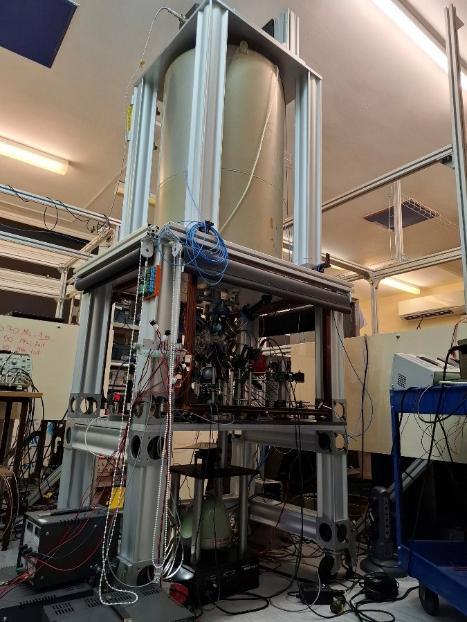Atom Interferometry at Liverpool
Welcome to the Atom Interferometry Group at the University of Liverpool. Our research harnesses the extraordinary sensitivity of atom interferometry to explore new frontiers in physics—from probing the nature of dark matter to testing the limits of quantum mechanics and gravitation.
Large scale Interferometry
We are members of the MAGIS-100 collaboration, a flagship international experiment hosted at Fermilab (USA), which aims to build and operate a 100-metre baseline atom interferometer. MAGIS-100 will create macroscopic quantum superpositions on unprecedented scales, enabling searches for ultralight dark matter, tests of quantum gravity, and prototype for the detection of mid-band gravitational waves—a regime between the sensitivities of LIGO and LISA. Our team contributes to a wide range of MAGIS activities, including:
- Development of the **retro-reflection system** for rotation compensation and phase-shear readout
- Analyses of systematic noise sources and experimental limitations
- Innovation in novel interferometry schemes for enhanced sensitivity and robustness
- leaders of the UK contribution to the experiment, which includes Oxford, Cambridge & Liverpool
We also play a key role in AION, the UK’s complementary experiment to MAGIS, which provides synergistic scientific goals. Liverpool’s contributions focus on both hardware delivery and physics strategy.
Our Lab
Our in-house rubidium fountain interferometer serves as an experimental focus of the group.

Liverpool’s rubidium fountain interferometer, developed in collaboration with NPL
Originally developed as a frequency standard at the National Physical Laboratory (NPL), it has been repurposed and transformed into a precision atom interferometer. Today, this system operates as a testbed for:
- Rapid development and validation of techniques for MAGIS, AION, and other future platforms
- Prototyping of new interferometry schemes aimed at exploring the interplay between quantum mechanics and gravitation
- High-stability measurements for fundamental physics tests such as precision measurement of the fine structure constant
Industrial Collaboration and Innovation
Our research has wide-reaching applications beyond fundamental physics. Atom interferometry and related quantum sensing technologies are poised to transform sectors such as navigation, geophysics, and national security. We work closely with industry partners—including AWE, NPL, and CPI TMD Technologies—to translate laboratory innovations into deployable technologies. This includes collaborative development of compact quantum sensors, reactor monitoring systems, and high-precision timing tools. Through these partnerships, we ensure our research delivers both scientific and societal impact while helping shape the UK’s strategic quantum technology landscape.
Broader Vision
Our work is part of a wider strategic commitment to quantum sensing. We are building a research environment that blends advanced hardware development, foundational physics, and strong industrial and international partnerships. Our group is growing rapidly and contributes to large-scale projects, with a commitment to interdisciplinary collaboration, technical excellence, and the training of the next generation of quantum scientists.
PhD Placements
We are always looking for motivated and curious individuals to join our team. If you're interested in pursuing a PhD in atom interferometry, quantum sensing, or fundamental physics, we would be delighted to hear from you. Our projects span experimental, theoretical, and applied work, and offer opportunities to collaborate with national laboratories, international experiments, and industry partners. Please get in touch to discuss current opportunities or to develop a proposal aligned with your interests.